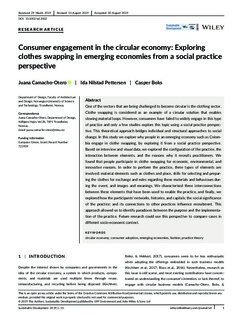Consumer engagement in the circular economy: Exploring clothes swapping in emerging economies from a social practice perspective
| dc.contributor.author | Camacho-Otero, Juana | |
| dc.contributor.author | Pettersen, Ida Nilstad | |
| dc.contributor.author | Boks, Casper | |
| dc.date.accessioned | 2020-02-13T12:04:50Z | |
| dc.date.available | 2020-02-13T12:04:50Z | |
| dc.date.created | 2020-02-10T14:56:49Z | |
| dc.date.issued | 2020 | |
| dc.identifier.issn | 0968-0802 | |
| dc.identifier.uri | http://hdl.handle.net/11250/2641541 | |
| dc.description.abstract | One of the sectors that are being challenged to become circular is the clothing sector. Clothe swapping is considered as an example of a circular solution that enables slowing material loops. However, consumers have failed to widely engage in this type of practice and only a few studies explore this topic using a social practice perspective. This theoretical approach bridges individual and structural approaches to social change. In this study we explore why people in an emerging economy such as Colombia engage in clothe swapping, by exploring it from a social practice perspective. Based on interview and visual data, we explored the configuration of the practice, the interaction between elements, and the reasons why it recruits practitioners. We found that people participate in clothe swapping for economic, environmental, and innovative reasons. In order to perform the practice, three types of elements are involved: material elements such as clothes and place, skills for selecting and preparing the clothes for exchange and rules regarding these materials and behaviours during the event, and images and meanings. We characterised three interconnections between these elements that have been used to enable the practice, and finally, we explored how the participants' networks, histories, and capitals; the social significance of the practice; and its connections to other practices influence recruitment. This approach allowed us to identify paradoxes between the purpose and the implementation of the practice. Future research could use this perspective to compare cases in different socio‐economic context. | nb_NO |
| dc.language.iso | eng | nb_NO |
| dc.publisher | Wiley | nb_NO |
| dc.rights | Navngivelse-Ikkekommersiell 4.0 Internasjonal | * |
| dc.rights.uri | http://creativecommons.org/licenses/by-nc/4.0/deed.no | * |
| dc.title | Consumer engagement in the circular economy: Exploring clothes swapping in emerging economies from a social practice perspective | nb_NO |
| dc.type | Journal article | nb_NO |
| dc.type | Peer reviewed | nb_NO |
| dc.description.version | publishedVersion | nb_NO |
| dc.source.volume | 28 | nb_NO |
| dc.source.journal | Sustainable Development | nb_NO |
| dc.source.issue | 1 | nb_NO |
| dc.identifier.doi | 10.1002/sd.2002 | |
| dc.identifier.cristin | 1792702 | |
| dc.description.localcode | © 2019 The Authors. Sustainable Development published by ERP Environment and John Wiley & Sons Ltd This is an open access article under the terms of the Creative Commons Attribution‐NonCommercial License, which permits use, distribution and reproduction in any medium, provided the original work is properly cited and is not used for commercial purposes. | nb_NO |
| cristin.unitcode | 194,61,45,0 | |
| cristin.unitname | Institutt for design | |
| cristin.ispublished | true | |
| cristin.fulltext | original | |
| cristin.qualitycode | 2 |
Tilhørende fil(er)
Denne innførselen finnes i følgende samling(er)
-
Institutt for design [1122]
-
Publikasjoner fra CRIStin - NTNU [38035]

